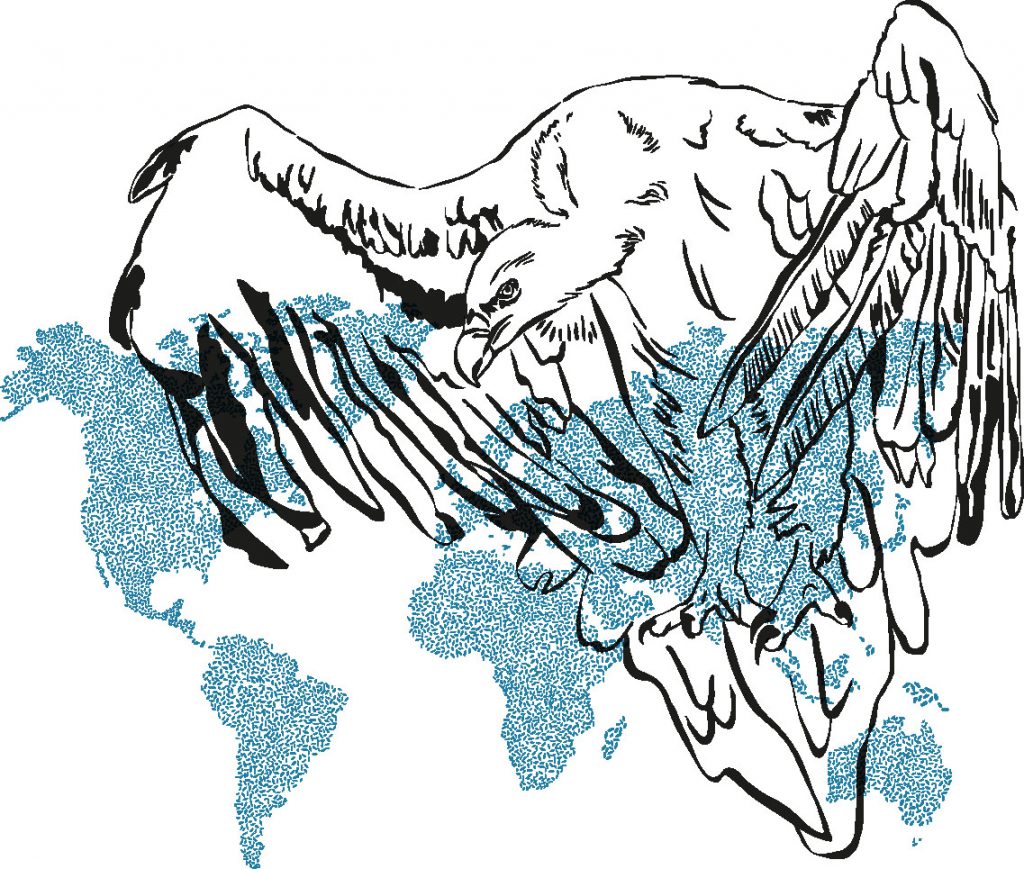Julian Assange
636 weeks of deprivation of liberty for telling the truth
636 weeks of deprivation of liberty for telling the truth

The discourse on the debt is directly intertwined with the discourse on the crisis, singing a refrain that goes back more than three decades. But even if the public debt has been on the media-political radar since the crisis of 2007–2008 — which turned into a debt crisis in Europe in 2010 and 2011 -, the causes, according to the political and economic « elites » and their media relays, are still the same: the State spends too much, it is necessary to tighten the belt, to make savings…
This dossier attempts to offer you an analysis of what debts really are, starting with the populations most affected by the « debt system », i.e. those « left behind » in the so-called Third World. The impacts of debt are very concrete for them, they are social, but also ecological and of course political. Let’s dismantle the preconceived ideas: there is no aid from the countries of the North!
It is rather neo-colonialism that is at stake, the expression retaining all its relevance when we demonstrate the hold of international financial institutions on the countries of the South, led by the World Bank and the IMF (pp.10–11). This political domination imposed as a matter of course, always in the tone of TINA (There is no alternative), spreads over every country, every continent, with some erratic introspective jolts. Even though the IMF sometimes mentions in its reports certain mistakes made, too much deregulation and unsustainable debt in this or that country, the same policies are still being applied.
In order to reveal the hidden side of this debt, namely its determining ecological impacts, we will also look at the so-called ecological debt (pp.14–15). If debt crises are a regular phenomenon in capitalism, the current era gathers many thresholds that can be reached, while each new crisis is likely to be more important than the previous one. A global debt crisis is brewing and is already affecting a number of countries in the South (pp.12–13). Low commodity prices and rising interest rates threaten to plunge the world into a situation of unprecedented magnitude, as for the past three decades the state of the financial and economic system has been characterized by its growing instability, placing its full weight on the populations.
In this world of increasingly fragile political and economic foundations, a new actor is acting without scruples to make a maximum of profits, without of course weighing the consequences of its actions: vulture funds, these financial companies that buy up the debt of States in difficulty at a very low price, at a fraction of its original value, and then claim 100% payment, plus interest and penalties. A striking case for Europeans because closer and therefore more visible, Greece suffered the attacks in 2012, with the ECB acting in the same way as these « procedural funds », only pushing the situation of the Hellenic economy deeper and precipitating radical austerity measures. In Belgium, a law was voted thanks to the determination of the CADTM, but the rapacious ones question it. The interview with Renaud Vivien goes into detail on this case and on the fight against illegitimate debts and its most odious representatives, the vulture funds (pp.16–17).
Among the few figures that illustrate the injustice generated by this debt system, let’s mention one to answer those who speak of a « spendthrift state » (meaning « too much money for the poor »): debt repayment in Belgium amounts to 40 billion, compared to 10 billion for social security.(1) The action of the CADTM, present at the last show of the COP22 in Morocco (p.18), proves that we must not let ourselves be fooled by defeatism, facing these financial predators. The future will depend on our victory against them.
File coordinated by Robin Delobel,
permanent CADTM Belgium and coordinator of the magazine Les autres voix de la planète .